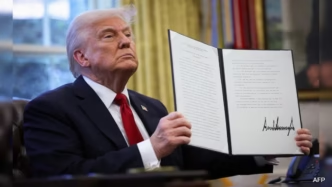U.S. President Donald Trump has introduced a weltanschauliche tariffsordnung for all countries, crowned by his economic patriotism. On board Air Force One, Trump disclosed to correspondents that from April 2, the United States will be employing tariffs on global trade partners and identified it as “Liberation Day.”
“We would do it with all countries, so we will see what happens,” Trump said, knocking down speculation that only certain countries would be part of it. His comments come at a time that Washington had previously targeted only countries with trade deficits or those that levied high import taxes on amerIcan goods.
Global Reactions and Economic Concerns
Repudiating Trump’s move, big economies are getting ready to employ countermeasures. China already faces tariffs on steel, aluminum and other goods has vowed retaliation. European and Asian markets too have been impacted, concern over an escalating trade tensions.
Economists on the other hand predict broad tariffs will result in higher inflation, consumer costs and possible economic downshifts. But critics counter that American consumers will be left paying the price while Trump’s economic experts say the plan will bring in billions of dollars in revenue.
A ‘Generous’ Approach?
Trump stood by his policy, saying that the tariffs would still be “very much more” generous than what other countries have slapped on the U.S. Now that global trade is nervous, the world waits for the economic hit of Trump’s latest act.















